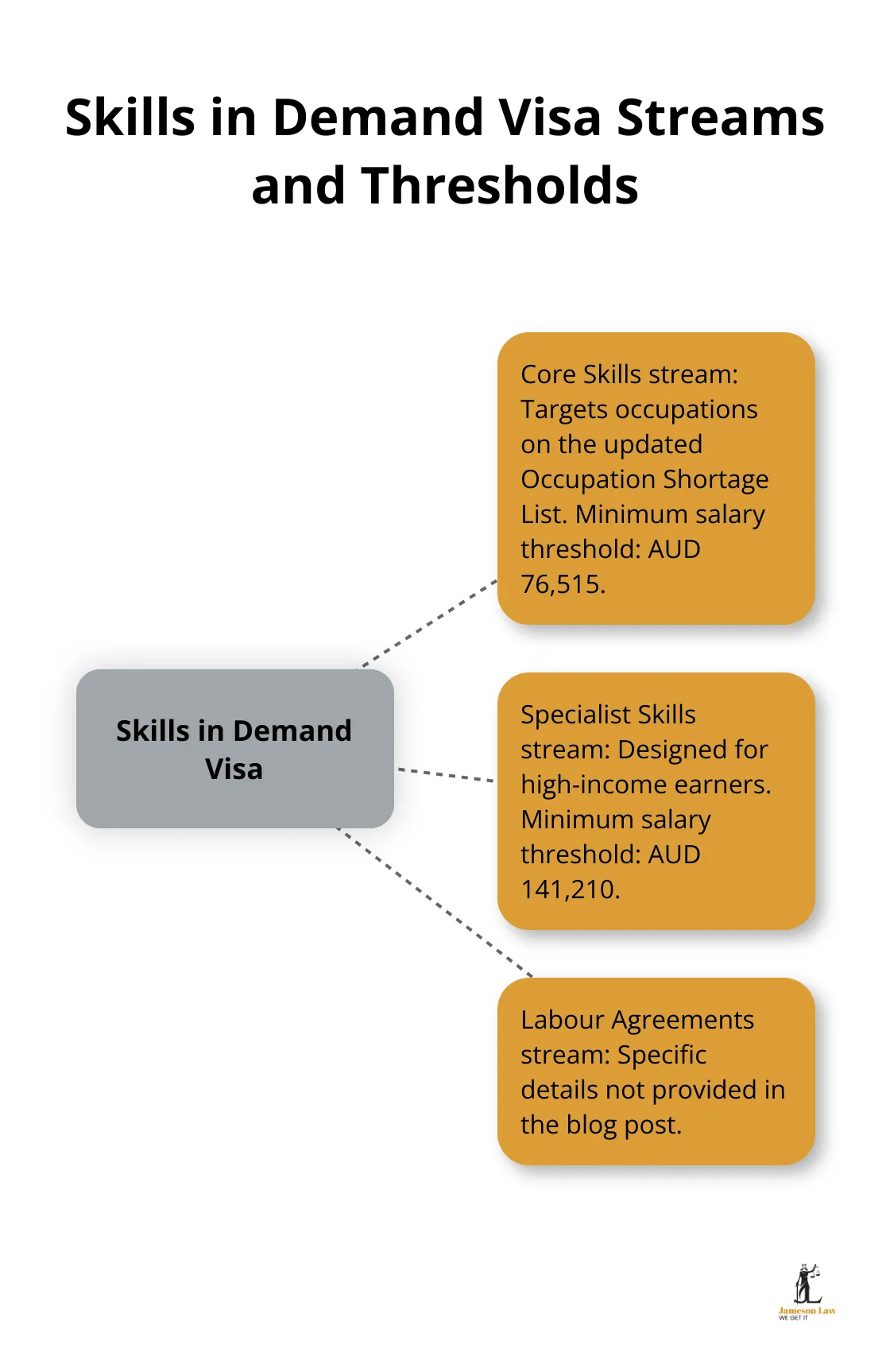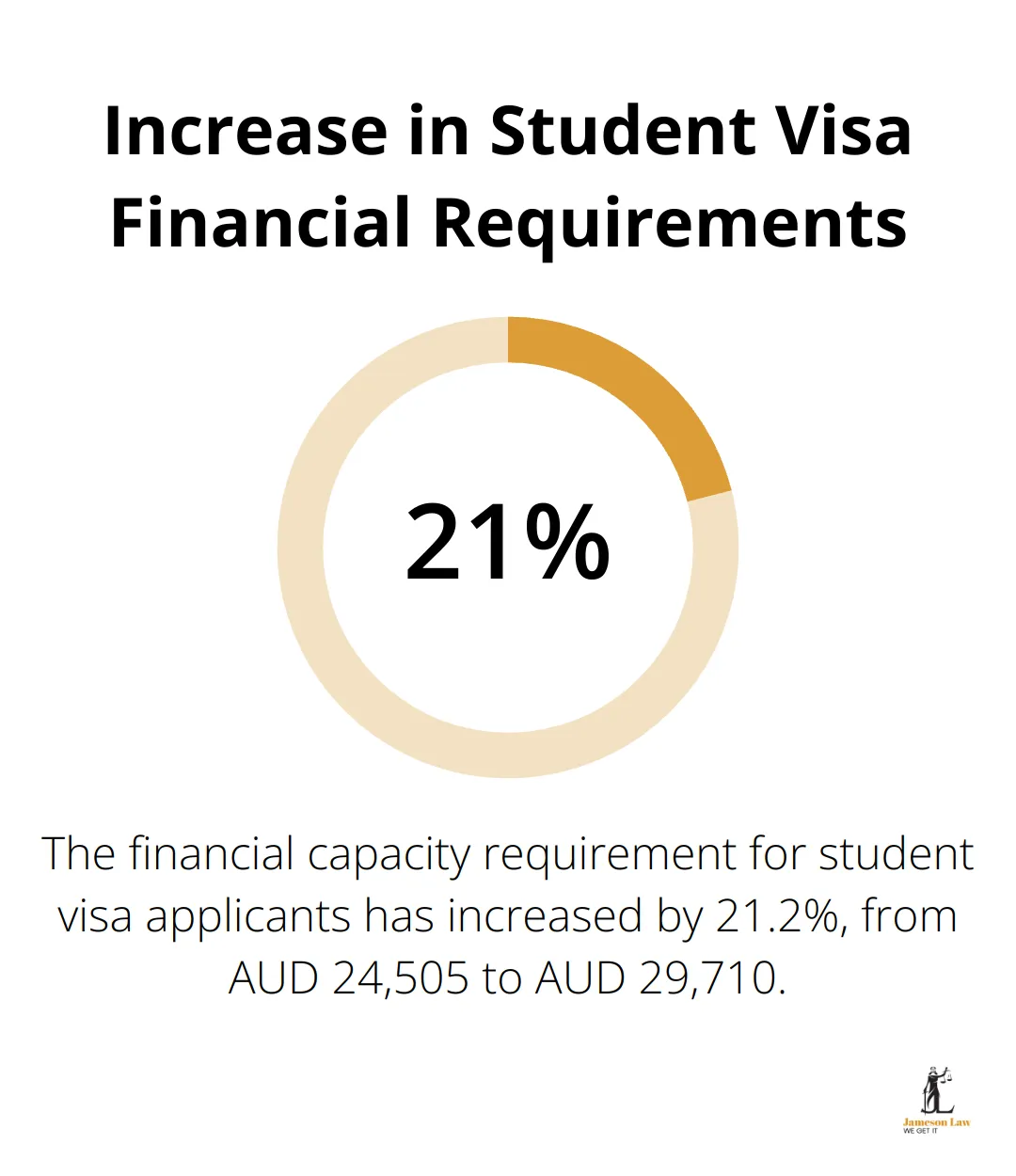Major immigration changes are set to take effect in July 2025, reshaping Australia’s visa landscape. These updates will impact visa application charge increases and revised skilled visa income thresholds. In this article, we will also revisit major changes over the past couple of years, including skilled migration, family reunification, and student visa regulations.
At Jameson Law, we’re committed to keeping you informed about these crucial developments. Our comprehensive guide breaks down the key Immigration Changes July 2025 and their potential effects on your immigration journey.
What’s New in Australian Immigration for July 2025?
The July 2025 immigration changes in Australia introduce significant updates to skilled visas, family reunification, and student regulations. These changes address Australia’s evolving economic needs and streamline the immigration process. As immigration lawyers in Sydney, we have analysed these changes for our clients.
Skilled Visa Overhaul
The changes this year are limited to financial updates as follows.
Visa Application Charge (VAC) Increases
In line with the Australian Government’s annual indexation policy, the Migration Amendment (Visa Application Charges) Regulations 2025, which came into effect on 1 July 2025, introduced updated visa application charges across most categories.
- Most visa subclasses have increased by 3%, rounded to the nearest $5.
- Student Visa (subclass 500) and Student Guardian Visa (subclass 590) saw a 25% increase, now priced at $2,000 per application.
Additionally, citizenship application fees, Administrative Review Tribunal (AAT) fees, and Federal Court filing fees have also been indexed to reflect CPI movements.
These changes may significantly impact budgeting for individuals, families, and organisations — especially within the international education sector.
Revised Skilled Visa Income Thresholds
Key income thresholds tied to skilled migration and employer sponsorship have also been adjusted to reflect inflation and economic benchmarks. The new thresholds, effective 1 July 2025, are:
- Core Skills Income Threshold (CSIT): $76,515
- Specialist Skills Income Threshold (SSIT): $141,210
- Temporary Skilled Migration Income Threshold (TSMIT): $76,515
- Fair Work High Income Threshold (FWHIT): $183,100
These updated thresholds are crucial for employers when determining eligibility, sponsorship obligations, and salary packages for current and prospective visa holders.
The Department of Home Affairs skilled visa categories introduced in the past continue as normal, with the same intent of attracting top talent and filling critical skill gaps. The Skills in Demand visa which replaced the Temporary Skills Shortage visa, still offers the three streams of:
- Core Skills
- Specialist Skills
- Labour Agreements
The Core Skills stream targets occupations on the updated Occupation Shortage List, with a minimum salary threshold of AUD 76,515. The Specialist Skills stream, designed for high-income earners, requires a minimum salary of AUD 141,210. These thresholds reflect a 4.6% increase from previous levels, aligning with changes in Average Weekly Ordinary Time Earnings (AWOTE).

In 2023, the Australian Government broke a decade-long standstill by raising the Temporary Skilled Migration Income Threshold (TSMIT) from $53,900 to $70,000. It also pledged to index the threshold annually thereafter. The most recent adjustment—to $76,515, effective 1 July 2025—upholds that commitment.
Although employers will face higher wage obligations, this increase better reflects Australia’s rising living costs and can offer greater financial security to temporary visa holders. Moreover, it underscores the government’s goal of maintaining fair pay standards in sponsored positions, safeguarding both domestic and migrant workers from undercutting.
Key components of the 2023 Migration Strategy remain in development, and any significant policy shifts were expected to await the next federal election. Meanwhile, Australia continues to prioritise skilled migration to fuel its economic agenda. While net overseas migration is forecast to ease in 2025–26, the focus on high‑value talent intensifies.
Late‑2024 visa introductions—such as the Skills in Demand Visa (subclass 482) for occupations experiencing shortages, and the National Innovation Visa (subclass 858) aimed at cutting‑edge innovators—demonstrate this strategic pivot. By favouring quality over volume, these pathways seek individuals who will deliver enduring benefits to Australia’s prosperity.
Previous Major Updates That Remain Unchanged as of July 2025
Family Reunion Simplification
Family reunion visa processes that have undergone significant changes to reduce waiting times and improve efficiency remain unchanged. The partner visa application process still follows a single-stage model, which eliminates the need for separate temporary and permanent visa applications.
The Parent visa category (subclass 870) offers a three or five-year temporary stay remains unchanged. This visa addresses the backlog in parent visa applications and provides more flexible options for families. A migration agent in Parramatta can assist with these applications.
Student Visa Modifications
International student visa regulations haven’t changed. The financial capacity requirement for student visa applicants remains as is from the last significant update, which ensures students can support themselves during their studies.
Work rights for international students remain expanded from the previous change. Bachelor’s degree students can still work up to 24 hours per week during term time (up from the previous 20-hour limit). Postgraduate students have unrestricted work rights, which allows them to gain valuable industry experience alongside their studies.
As the immigration landscape evolves, it becomes increasingly important for applicants to understand these regulations. Professional guidance can help navigate the complexities of the updated system and increase the chances of a successful visa application.
Family and Student Visa Updates
Partner Visa Simplification (no new update)
The simplified partner visa overhauled by the Department of Home Affairs hasn’t changed the partner visa application process. The Partner Visa 820 processing time is currently nine to eighteen months, but this can vary based on individual circumstances and the completeness of your application.
Applicants now submit one comprehensive application for both temporary and permanent residency assessment. This streamlined approach reduces time and financial burdens for couples.
The Department has also launched an online portal for document submission and status tracking.
Innovative Parent Visa Options
The government has introduced new parent visa options to address the growing demand for family reunification. The Temporary Parent Visa now offers two streams:
- A three-year visa
- A five-year visa
These options provide more flexibility for families and address the backlog of parent visa applications. Parents do not need to have the balance of family living in Australia.
The quota for parent visas has increased for the 2025-26 programme year. This boost will allow more families to reunite and contribute to Australia’s multicultural society.
Enhanced Student Visa Conditions
International students will see substantial changes to their visa conditions, particularly regarding work rights. Bachelor’s degree students can now work up to 24 hours per week during term time (up from the previous 20-hour limit). This change allows students to gain more work experience and better support themselves financially.
Postgraduate students now have unrestricted work rights, enabling them to fully engage with their chosen industries alongside their studies. This policy shift aims to attract high-calibre international students and retain skilled graduates in the Australian workforce.
However, these expanded work rights come with increased financial requirements. The visa fee has increased to A$2,000. This ensures students can adequately support themselves during their stay in Australia.

The Department of Education has also introduced a new scholarship programme for international students in STEM fields. This initiative aims to attract top global talent to Australian universities.
Final Thoughts
The Immigration Changes July 2025 will reshape Australia’s migration landscape significantly. These updates address skill shortages, boost regional development, and streamline family reunification processes. The new skilled visa categories, including the Skills in Demand visa, demonstrate Australia’s commitment to attracting top talent while ensuring fair compensation for migrants.
Families can expect a more efficient reunification process with the simplified visa procedures and new parent visa options. International students will benefit from expanded work opportunities, although they must meet increased financial requirements. These changes will impact various groups differently, requiring potential migrants to reassess their eligibility and plans.
The complexity of these new regulations highlights the importance of professional legal advice. At Jameson Law, we specialise in immigration law and can provide expert guidance to help you navigate these changes successfully. Our team of immigration lawyers in Parramatta and Sydney stays current with the latest developments to ensure you receive accurate and timely advice tailored to your specific situation.
Disclaimer
The above is general legal information and should not be considered legal advice. You should speak with one of our lawyers for legal advice tailored to your specific legal matter. The courts and tribunals deal with matters on a case-by-case basis. Our lawyers are based in Parramatta and Sydney, we cannot assist with legal advice in a range of jurisdictions whether in Melbourne, Brisbane, Adelaide or Perth.













